Your cat's body language
- Home
- Our blog
- Your cat's body language
For many cat lovers, our pets are our best friends. But how well do we really know them? What do they want? How to read cat body language?
Although cats might seem hard to read, there are lots of tell-tale signs that will give you an insight into what your companion is thinking, and what kind of mood they’re in! You’ll probably be able to tell some of your cats more obvious moods already from their body language, facial expressions, vocalisations and tail movements.
Cats have a wide range of basic emotions – they feel happy, sad, afraid, relieved and even frustrated, just like us humans! The key to a good relationship with your cat is learning how to recognise these emotions, and respond where needed.
Neutral (Relaxed)
|
If lying down, they could be stretched out, curled up into a ball, or lying on their front with paws neatly tucked underneath them.
- Their eyes might be blinking softly, or half closed.
- Their ears will be relaxed, held casually upright and forward – although they could swivel around independently if your cat is listening to things around them.
- Their whiskers will be relaxed, away from the sides of their face, and they may almost appear to smile!
- Their body is nice and relaxed, with no tension to suggest they might be about to spring into action.
|
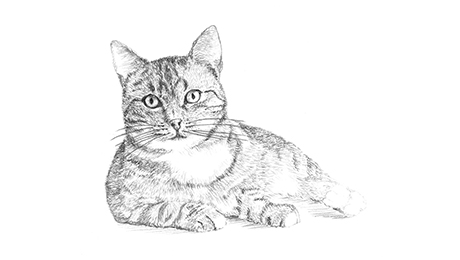 |
Focused
- Their eyes will be open with pupils narrowed.
- Their ears and whiskers will be pricked forward, with their body angled towards the focus of their attention.
- Their body might be low to the ground as they stalk, with hind legs coiled under their body.
- Your cat’s tail language will show focus by being held out low behind them. The end of their tail, along with their hindquarters, might be twitching as they get ready to pounce.
- If the object of their focus is you, for example if they’re trying to get food or strokes, they might rub against you with tail held in the air, but don’t be fooled – they’re still focused on their end goal!
|
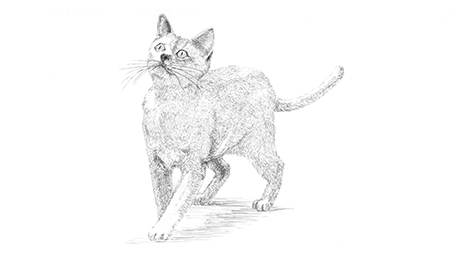 |
Happy
- When sitting, your cat will be relaxed and upright, with ears pointed up and forward, but relaxed, sometimes swivelling gently towards familiar sounds like your family’s voices.
- When lying down, they may have their paws tucked neatly underneath them, or be lying stretched out on their side or even on their back, with legs spread outwards, which shows they are very happy!
- They may snooze with their eyes closed or half open, or look heavy-lidded – almost like they are daydreaming at times! If they blink very slowly, try blinking slowly back to show you’re relaxed too – this mimicking behaviour is a great way to bond with your cat.
- Whiskers will be relaxed and their tail still – or held high with a slight curl if they’re standing to say hello to you.
- If you stroke your cat, their eyes may close in contentment and they will gently purr.
|
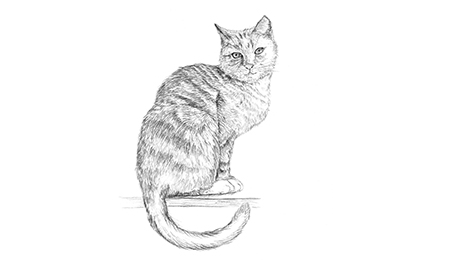 |
Anxious
- Your cat's eyes will be open and not blinking, with pupils dilated into an oval or circle.
- Their ears might move from their relaxed forward position to scan for more information, swivelling around independently from each other. If they are very anxious, they may even flatten back to their head.
- Their head will begin to lower, with whiskers pulled back to the side to appear small and non-threatening – or even be swept forward on alert.
- As anxiety increases, your cat might start to cower, or their back might arch to prepare to run.
- Cat tail language is very important – it might be still or moving slowly side to side at the tip, which is a sign of anxiety.
|
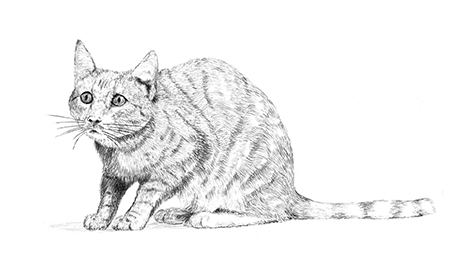 |
Fearful
- Your cat’s ears will be flattened back against their head, which might be lowered with gaze angled upwards.
- They may run away, or stand or crouch very still if this isn’t possible.
- Their eyes will be open very wide, with pupils fully dilated and whiskers flattened or bristling.
- They may hiss or spit at close threats, growl or strike with claws out.
- Some cats will straighten their front legs to make themselves look taller, or arch their backs and fluff themselves up to look bigger.
- Their tail may be held under their body, or be slashing vigorously from side to side.
|
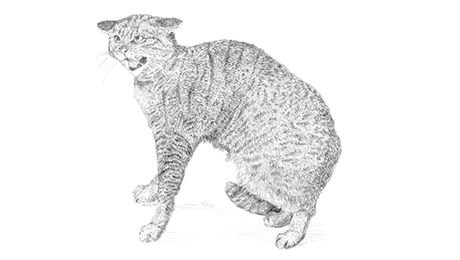 |
Frustrated
- An actively frustrated cat usually focuses intently on their object of frustration, and will try everything they can do to get what they want!
- All their senses are tuned onto their goal – eyes will be wide open with pupils dilated, ears forward, and whiskers forward-pointing and spread.
- They may pace impatiently if they can’t get to what they want.
- Cats can’t maintain this frustration forever, so if they can’t get what they want, they will either give up, or in some cases enter into a longer-term frustration or even depression, depending on the source of their frustration.
- Cats with longer-term depression may often be lethargic, off their food and won’t want to play or interact with others.
|
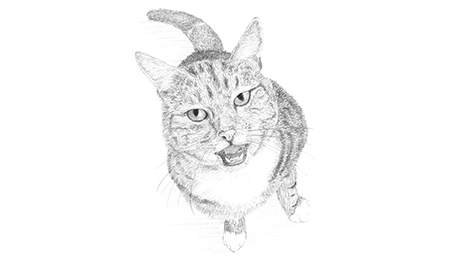 |
Angry
- An angry cat will be rigid, with tail held out stiff and straight or curled around and under their body.
- They will act very differently from usual – they could be silent, hissing, spitting or growling.
- They will try to look large and threatening, with fur erect, stiff front legs, or crouching in a threatening manner.
- Their ears will be tense, and flat back against their head, and whiskers will be stiff away from their face.
- Their eyes will be hard and focusses. Their pupils may be narrowed, although some cats might have round, unblinking eyes
|
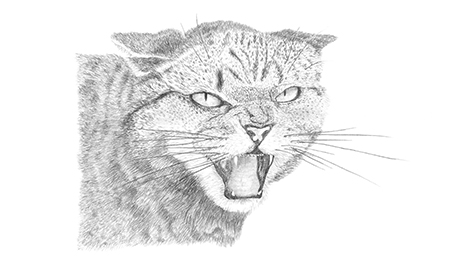 |
Relieved
- A cat’s whole body can show relief – some cats even make a full-body stretch to release tension!
- Their eyes, ears, head, body and tail will all visibly relax.
- Whiskers will return to a calm, position away from the face, and their head will lower.
- Some may yawn, turn away and half-close their eyes, or even have a good wash.
|
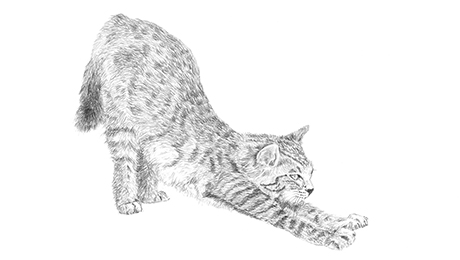 |









